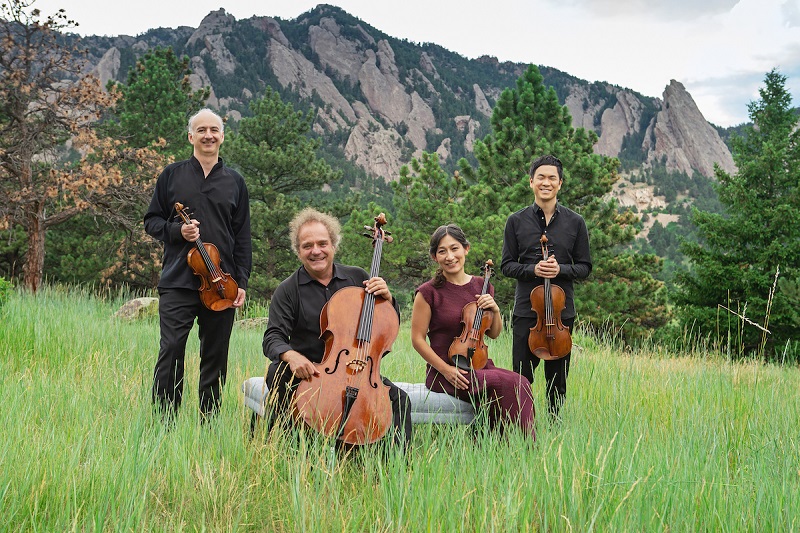
RADICAL INVENTIVENESS IN STRING FOURSOMES
BERKELEY—Striking enough were the unruly progressive touches in the Beethoven E Minor (“Razumovsky”) string quartet. On top of that came another four-movement string quartet, “Flow,” by Nokuthula Endo Ngwenyama, 47, breaking traditional bounds and expanding sonic boundaries with her world premiere.
All this was poured out by the veterans of the Takács Quartet before a sizable audience at Hertz Hall on the UC campus Nov. 12, with the premiere composer in attendance.
Enigmatic music is the new composer’s hallmark, giving the unsung viola the lion’s share of prominence, and having the violins reach the highest tones in unresolved figures, with the cello often in a time-keeper mode or as foundation stone. I was most struck by the enigmatic ruminations in the Adagio, led of course by the viola, leaving the violins in a free-wheeling fling far above the colleagues.
The later movements are marked by starts and stops in a mystery world—tying in as well to the Beethoven opus—and yet another hard-fiddling viola solo by Richard O’Neill. Adding to the enigmas, the players will produce a surprise pizzicato (plucked) note where least expected.
Employing many contemporary techniques, this Phoenix-based composer of Zimbabwean-Japanese parentage produced an engrossing work also sprinkled with scientific allusions to everything from starling to startling: murmurations to black-hole collisions. Her goal was to produce mindful awareness in her audience.
Presumably because of the starts and stops, the final opus was Beethoven’s Op. 59, No. 2 in E Minor. I relish his late works, but I absolutely adore this mid-period quartet because of its unpredictable quality—and not because of the famous Russian quote known also from “Boris Godunov,” inserted to please the Russian sponsor Razumovsky.
There’s no program attached to the E Minor, but I conjure up a recurrent scenario in this unique work: A taut stop-and-go drama charging through somber forests, full of tense silence and release, with wild beasts waiting in ambush, the only respite coming in the Adagio, a focus of lakeside tranquility. (But don’t tell it to Beethoven, who usually and strenuously avoided programmatic music.)
In addition, the ensemble played the thought-provoking “Sunrise,” among the last of the quartets by Haydn—so much more fulfilling than the earlier Haydn symphonies and chamber music usually heard on classical radio. Its Adagio is masterful in its contemplative dimensions.
MUSIC NOTES—The Takács players will give nearly 10 more concerts introducing “Flow” to various audiences near and far, much of it part and parcel of the bold 17-day California Festival: A Celebration of New Music….A stellar violist herself, Ngwenyama also holds a master’s degree in theology from the Harvard Divinity School.
Overall, Cal enjoys some of the most intensive music programs given by top touring ensembles of our many universities. But it entails some risk, as I found on exiting Hertz Hall when a hard-hit cricket ball nearly skulled me—just an episode of a pick-up game right atop pedestrian paths, played by foreign students who introduced the sport here a few years ago, now lamentably confronted by the paucity of recreational fields around the Campanile-centered campus.
CAL PERFORMANCES presents the Takács Quartet, with a Ngwenyama world premiere, Nov. 12, Hertz Hall, Berkeley, CA. For info: (510) 642-9988, or go online, calperformances.org.